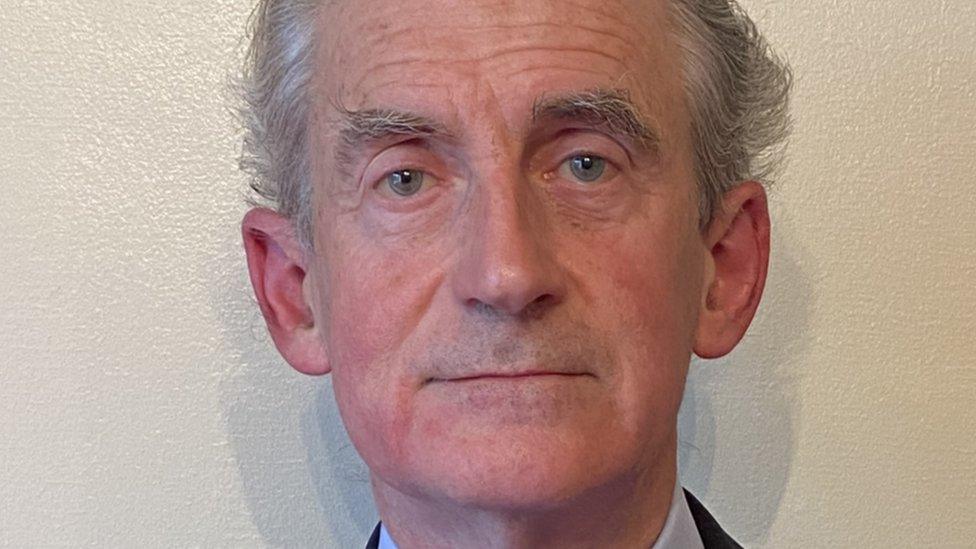NI Assembly: Dr Melissa McCullough is new standards commissioner
- Published

Dr Melissa McCullough has been appointed as the new standards commissioner for Stormont assembly members (MLAs).
It was the first item on the agenda at the assembly, as parties returned to the chamber following the summer break.
Dr Melissa McCullough's term will take effect immediately.
There had been no-one in post to investigate potential breaches of the code of conduct for MLAs since 2017.
Dr McCullough is an academic with a research record in law and ethics.
Her appointment was supported by all the main parties.
It is understood she will be able to retrospectively investigate complaints made against MLAs over the past three years.
However, recommending sanctions remains a matter for Stormont's standards committee.

Dr Melissa McCullough is an academic with a research record in law and ethics
The post of assembly standards commissioner had been empty since Douglas Bain stood down three years ago, after his five-year term ended.
The collapse of power-sharing at that time meant a successor could not be ratified.
Retired solicitor Paul Kennedy was due to take over the role in July, but unexpectedly withdrew from the appointments process.
The post of assembly standards commissioner has been empty since Douglas Bain stood down in 2017, after his five-year term ended.
The collapse of power-sharing at that time meant a successor could not be ratified.
Retired solicitor Paul Kennedy was due to take over the role in July, but unexpectedly withdrew from the appointments process.

Who is Dr Melissa McCullough?
An American who moved to Northern Ireland in the 1990s, Ms McCullough is an academic expert in medical ethics and law.
She raised concerns about her own treatment from a Belfast neurologist who was suspended by the Belfast trust amidst concerns about possible misdiagnoses.
In April, Ms McCullough also warned about the need to provide personal protective equipment (PPE) to frontline care workers after her own mother died in a US nursing home hit by a Covid-19 outbreak.
Dr McCullough's published work and research interests include professionalism, organisational ethics, applied ethics, equality and justice in policy and practice, diversity and inclusion, and public health ethics.
She moved to Northern Ireland from the United States in 1994 and is married with three children.

Later on Monday, the Stormont parties also passed a motion tabled by the SDLP calling on the British government to extend its coronavirus job retention scheme, "to provide future support to businesses and workers" in Northern Ireland.
Last week, the Stormont Executive supported a proposal for Finance Minister Conor Murphy to write to the chancellor expressing a similar concern.
However, the government has repeatedly ruled out the possibility of a further extension.
All of the Stormont parties backed the move, making the NI Assembly the first devolved legislature in the UK to formally call for it.
A Sinn Féin amendment calling for the scheme's deadlines to be adjusted to allow for new entries in the event where businesses are forced to close due to clusters or further lockdowns, was also supported.

MLAs will also discuss a DUP proposal calling for tougher sentences for those who attack emergency workers
The government's coronavirus furlough scheme began winding down last week, with companies using the scheme now having to contribute to workers' wages before it ends in October.
More than 200,000 workers in Northern Ireland were furloughed after the lockdown began in March.
'Widespread public frustration' with sentencing laws
MLAs also backed a call for tougher prison sentences for those convicted of attacks against emergency workers in Northern Ireland.
The DUP proposal said it reflects the "widespread public frustration with current outcomes", and that it should apply to those convicted of attacking police officers, prison officers, firefighters, search and rescue workers and frontline health care staff.
It follows a call by First Minister Arlene Foster last week for higher sentences for those found guilty of murdering public servants.
Neither motion is binding but indicated the level of strength within the assembly for the two moves.
- Published21 July 2020

- Published7 July 2020

- Published15 September 2017

- Published8 June 2016
